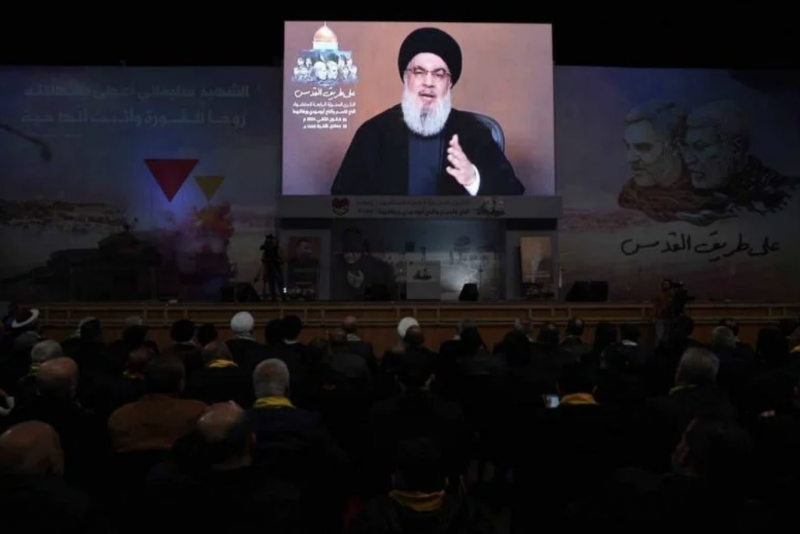
Hezbollah leader Hassan Nasrallah during his speech on Wednesday, Jan. 3, on the fourth commemoration of the assassination of Kassem Soleimani, broadcast at the event organized in the southern suburbs of Beirut for the occasion. (Credit: Mohammad Yassine)
“When we opened the southern front on Oct.8, we did so to support the oppressed people of Gaza, while taking into consideration the national interest and the difficulties in Lebanon,” Hezbollah leader Hassan Nasrallah said.
This statement serves as a key insight into the party’s decision-making throughout the war.
During his much-anticipated speech, Nasrallah appeared unusually calm and occasionally smiled as he spoke to a gathering in the southern suburbs of Beirut, commemorating the fourth anniversary of Iranian General Qassim Soleimani’s assassination in a US strike in Iraq.
Although Nasrallah had scheduled this meeting (along with another on Friday) before the assassination of Hamas’s number two, Saleh al-Arouri.
However, his demeanor appeared to be sharply contrasted with the recent dramatic attacks on the “Axis of Resistance.”
The sequence began with the Israeli strike on Dec. 25, 2023, in Damascus, assassinating the highest-ranking general in the Iranian Islamic Revolutionary Guard Corps (IRGC)’s Quds Force, Razi Moussavi. Subsequently, Israel killied Arouri on Tuesday. This is not to mention the unclaimed attack on Wednesday resulting in at least 103 casualties near Soleimani’s tomb in Iran.
‘We do not fear war’
At a time when fears that the conflict between Israel and the “Axis of Resistance” would spread throughout the region have increased considerably, Nasrallah used the same rhetoric, threatening Israel with reprisals and promising “victory,” which he said was already happening, as the Israelis “failed to achieve their objectives in Gaza.”
“For three months to date, we have had martyrs, sacrifices, displaced persons, damage, destruction, dangers and prices to pay,” Nasrallah said. “But we also have resistance, courage, fighting, defiance, losses in the enemy’s [Israel] ranks and we refuse to surrender.”
He continued, “What has been happened since Oct.7 and will continue to happen in the future has weakened Israel ... and put it on the road to extinction.”
“No one will be able to defend it,” Nasrallah said.
On the ground, Hezbollah fighters persist in their attacks against Israeli positions along the border, focusing on sectors they have targeted since Oct. 8, adhering to the same rules of engagement.
“For the moment, we are fighting on the front line in a calculated manner ... but if the enemy [Israel] is thinking of launching a war against Lebanon, we will fight without limits, without restrictions, without borders, and [the enemy] knows what that means,” Nasrallah said.
His words seem to justify a measured reaction given the latest developments.
However, he added, “We are not afraid of war.” Nasrallah stressed that, in the event of war, it would be in Lebanon's best interest to “wage war to the bitter end, without restraint.”
The Hezbollah leader emphasized that on Oct. 8, when the party launched hostilities in southern Lebanon, the “resistance was not deterred, and today, it is more prepared than ever.” According to him, what has restrained Israel from launching a war so far is the strength that exists in Lebanon.
“The Israelis thought this was an ideal opportunity to eliminate Hezbollah, counting on the support and sympathy of the international community,” Nasrallah said. “However, they didn’t. Why? Because the resistance deprived them of the element of surprise by taking the initiative and opening the front.”
‘A crime that will not go unpunished’
Addressing the assassination of al-Arouri and six other leaders and executives of the Islamist movement and its allies, Nasrallah characterized it as “a dangerous crime on two counts” due to both “the assassination” itself and the unprecedented targeting of the southern suburbs since 2006, during the Israel-Hezbollah war.
Nasrallah asserted that this act of violence “will not go unpunished,” reiterating the sentiments expressed in his party’s statement following Tuesday evening's attack.
While paying tribute to the “martyrs,” he declared, “Your blood, your sacrifices... will have a positive impact on Palestine, Lebanon, Iraq, Syria, Yemen and the entire region.”
Those familiar with Hezbollah understand that a retaliation to the strike in the heart of the southern suburbs is inevitable. Israel has crossed a red line that the party cannot ignore, particularly in the eyes of its popular base.
However, reading between the lines of Nasrallah’s speech reveals a calculated response, taking into account the party’s strategic interests, including those of its Iranian sponsor, without jeopardizing its most potent armed wing.
“When I said that the Al-Aqsa Flood was a Palestinian operation of which we were unaware, it was not to distance ourselves from this operation,” Nasrallah said. “The resistance organizations operate independently in their respective countries, making decisions based on their own interests and the interests of their people.”
Hezbollah did not seek vengeance for the assassinations of its military strategist Imad Moghniyeh and Iranian General Soleimani, which suggests that the party won’t change its strategy now with the assassination of al-Arouri.
The potential risk of escalating the situation into a full-scale war is a prospect that all involved parties, including the Israelis, appear to dread.
The Israeli government refrained from claiming responsibility for the attack, and Benjamin Netanyahu’s adviser swiftly sought to downplay its impact, asserting that it was not directed at Lebanon or Hezbollah.
Notably, the American fleet withdrew from the Mediterranean, and Washington distanced itself from the Israeli operation. Nasrallah’s speech painted a picture of the ongoing state of affairs which is marked by brinkmanship, measured attacks, retaliatory actions and undisclosed negotiations, especially with the anticipated visit of American envoy Amos Hochstein to Israel this week.
This article was originally published in L’Orient-Le Jour. Translated by Sahar Ghoussoub.